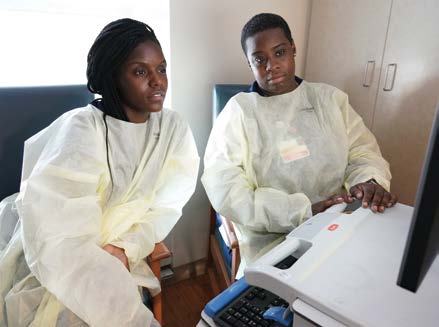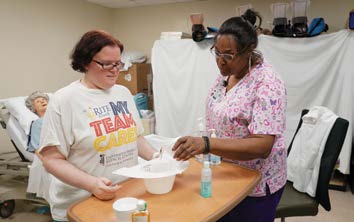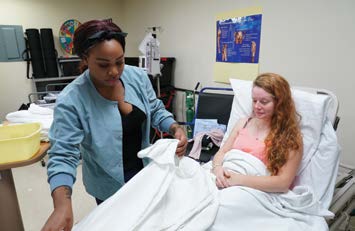“ IF YOU WANT TO DO BETTER IN LIFE YOU HAVE TO TRY. YOU HAVE TO TAKE OPPORTUNITIES.”
August 22, 2018

This spring and summer, twenty-five 1199SEIU members who work at the University of Maryland (U of M) Medical Center’s Midtown Campus in Baltimore, participated in an innovative apprenticeship program to help workers advance their careers and increase the numbers of Certified Nurses’ Aides (CNAs) and Patient Care Technicians (PCTs)in the healthcare workforce.
The apprenticeship program, which was launched in March 2018 and is open to CNAs and service and maintenance workers, grew out of a partnership between the University of Maryland Medical Center Midtown Campus, 1199SEIU’s Training and Upgrading Fund and the Maryland Department of Labor, Licensing and Regulation. At press time, the first cohort of CNAs was set to graduate and begin their on-the-job training, with a second group finishing their classroom and clinical studies to become PCTs.
Transport worker Renee Brown is a member of U of M’s Joint Apprenticeship and Training Committee, which worked with the Training and Upgrading Fund to develop the program and devise apprenticeship criteria.

The program is a U.S. Department of Labor Registered Apprenticeship and provides combined paid work training with related instruction to progressively increase workers’ skill levels and wages. Apprentices earn a full salary while dividing their time between work and classroom and clinical hours. During the six-month program, enrollees learn bedside skills and practical skills like phlebotomy and CPR, as well as academic subjects like pharmacology and anatomy and physiology. All learning takes place on the job site, in classrooms, and on patient floors under the supervision of watchful instructors, mentors and preceptors.

The day 1199 Magazine visited, Gray and another student were being supervised by a Registered Nurse as they monitored a geriatric patient. “This program will help me get the experience I need,” she says. “It’s so great because you get to help people in need and it’s hands on; you connect with your patients. I’ve learned so much about feeding people and taking care of people with special procedures.
And I’ve really learned to multitask. It was helpful that the trainer I had was very hands on. She’d show me how to do something, then let me do it, and then we would go over it.”
Gray, whose brother Freddy was killed in 2015 while in police custody, aspires to become a Registered Nurse, specializing in emergency or pediatric intensive care.

“It can be a little crazy with my work schedule of 3 p.m. to 11 p.m. and then having to be back here early the next day for class, but it’s worth it,” she says. “I love to learn.”
“It’s stressful, rewarding and complicated,” agrees Syerah Hoter- Stephenson, who entered the program as a floating medical assistant and plans on going into obstetrics nursing. “But I know what the possibilities are, and I know for sure I’m capable of doing anything.” For more information, visit www.1199SEIUbenefits.org or call the 1199SEIU Training and Upgrading Fund at 410-752-4068.
1199 Magazine: July / August 2018

